When you think of Roland-Garros, his name immediately comes to mind. Rafael Nadal has forged a unique connection with the Paris tournament, claiming the clay as his own kingdom. After his tennis career came to a close in 2024, the Spaniard talks here about his history with Roland-Garros. He opens his heart to give us an insight into the special relationship he developed with “his” tournament and “his” fans.
Rafael Nadal: The place I love the most
Extracted from interviews given in June 2024 and February 2025
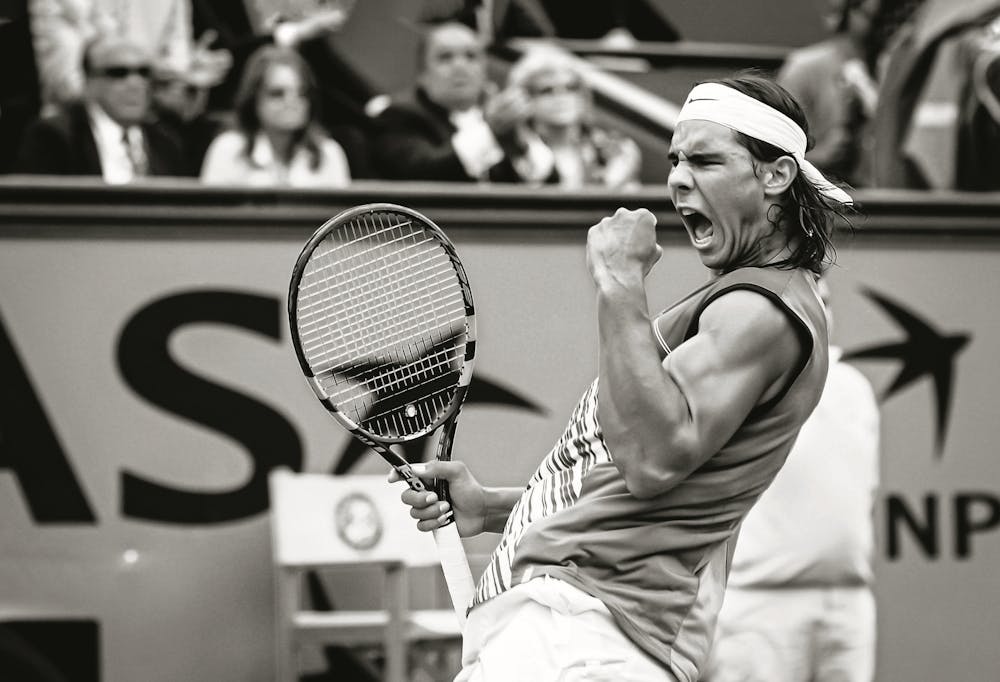 ©Corinne Dubreuil / FFT
©Corinne Dubreuil / FFTTell us about the first time you visited Roland-Garros
The first time I came to Roland-Garros was in 2004. I was on crutches. I was sad because I was already supposed to play that year, but I injured my foot a few weeks earlier. I remember arriving at Roland-Garros, a place that I had watched on TV my whole life, and, even on crutches, going to the highest part of the stadium and thinking, “hopefully next year I will be here achieving good things”. It was sad because I had dreamed of playing at Roland-Garros for the first time for so long.
Did that make 2005 more special?
2005 was very special. It was my first title at Roland-Garros, my first Grand Slam title. Things went very quickly because I started the year ranked around 50. And a few months later, I was fighting to make it to Roland-Garros, feeling I was maybe not the favourite, but one of the favourites, because I had had a great clay court season. I arrived with a different kind of challenge, playing best of five for two weeks and handling the nerves... I remember having a tough draw because I met Richard Gasquet in the third round, a match that I almost lost in Monte-Carlo. But then things went well, and I was able to find a way to win my first title. It has been unforgettable. I remember it was Zidane who presented me with the trophy. A great memory. But when I held the trophy in my hands, I thought, 'OK, now I can relax for the rest of my life, I’ve achieved everything I’ve been fighting for.' But then you realise, year after year you say 'no, I want to experience more of this every time'.
In the semi-finals, you beat Roger Federer. Can you describe how challenging it was to face him at his best?
When you are a very young player, you don’t feel that weight. You feel the nerves, the pressure, but all in a positive way that adds to your motivation, because you feel you don’t have much to lose. I went on court with the motivation to try to win the match, because I had lost against him in Miami over five sets. That gave me some confidence that I could do it. But at the same time, the semi-final of Grand Slam is quite different. I went on court with the determination to play aggressively, to play with the highest level of intensity possible. And I think I played tough, as it should be against an amazing player like Roger. I played with the right determination.
What about your rivalry with Novak Djokovic? You played against him for the first time in 2006.
Novak was a real contender for me, even before 2007 and 2008, our first semi-finals here against each other. For a couple of years, I would beat him, suffering a lot. I played him many times: in 2012 in the final, in 2013 in the semifinals, in 2014 again in the final, if I’m not mistaken, and then in 2015. That year, I played the worst tennis of my career. That was probably the only time I went on court knowing I had little chance of winning, because I was not ready to play at the level I needed to play at to beat a player like Novak. I went on court knowing it was going to be almost impossible.
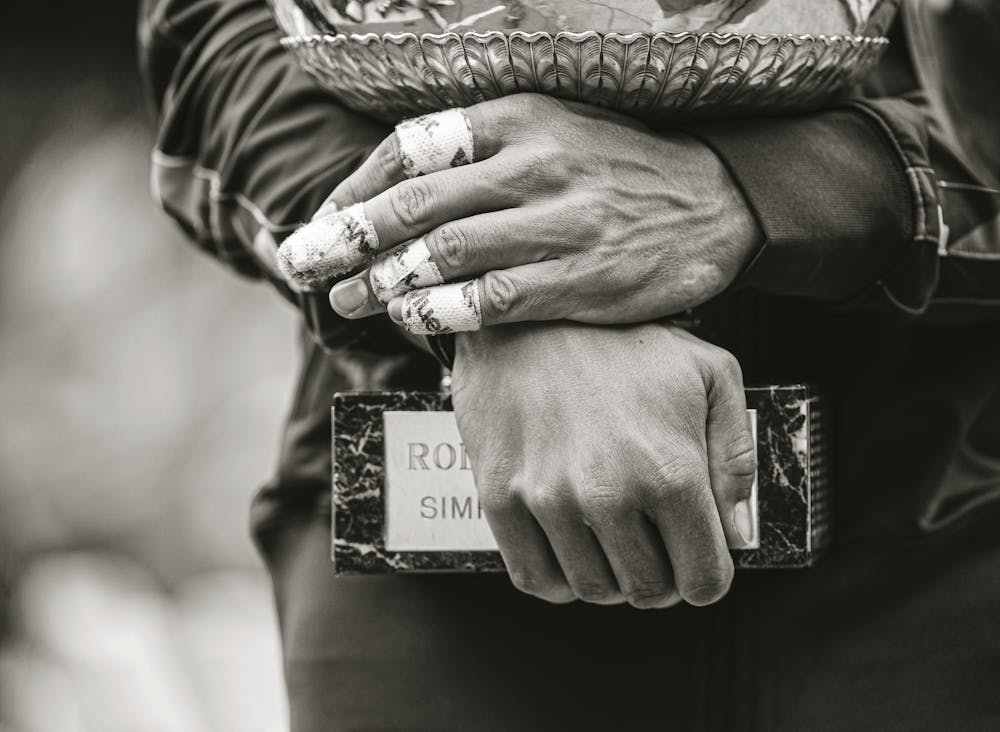 ©Corinne Dubreuil / FFT
©Corinne Dubreuil / FFTRafa's hands during the Roland-Garros 2012 trophy presentation
In 2013, you beat him 9-7 in the fifth set in the semi-finals. Tell us about that match.
That match was very emotional. I was serving for the match in the fourth, so in some way I had the match more or less under control, but it was difficult to win games against the wind. And I lost my serve serving for the match. Then it was brutal, he started playing like a machine on court, not missing, playing very aggressively, and in the fifth, everything was to the limit. He led the score 4-2, something like that, a few things happened, and the match was on a knife edge. Anything could have happened in the end. I was able to find a way, but it was very tough. One of the toughest matches in my whole career at Roland-Garros.
Would you say the most special times were when you’ve struggled and overcome adversity?
100%. Those years make me feel prouder, happier and have been much more emotional. I am not the player that enjoys winning matches easily. When we talk about personal satisfaction and happiness, it always has been more special to me to win when facing a big challenge. I like to win, of course, but I like the challenge. I like the competition. I enjoy it much more when the things I achieved were difficult to achieve.
Where does that motivation come from?
It comes from the love of the game. That’s the main thing, and a passion for what I am doing. I love the sport. I am not only a professional tennis player, I am a big fan of the sport in general. The moments in the sport that I was able to watch and follow as a fan inspired me and drove me to the next level of passion and motivation.
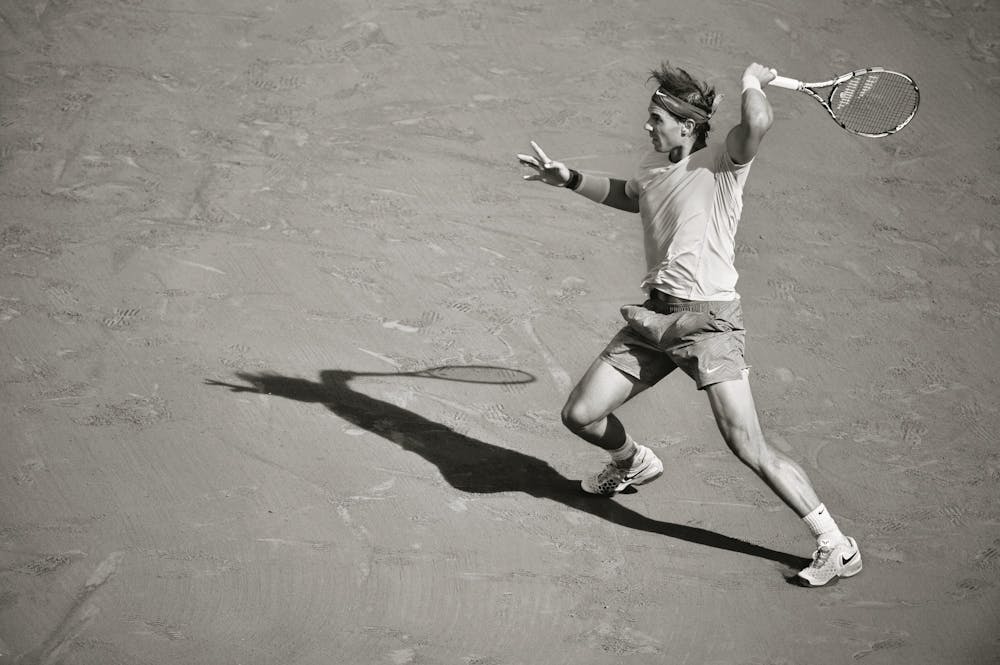 ©Corinne Dubreuil / FFT
©Corinne Dubreuil / FFTRafael Nadal, Roland-Garros 2014 semi-final
Did you ever kind of feel unbeatable?
No. I never felt like that at any time in my whole career.
How did that relationship with the Parisian crowd change over the years?
I always felt respected, but it’s true that in the first couple of years, I felt the crowd wanted Roger to win. In some way, they wanted me to lose probably because they felt that if I lose here, Roger would have a better chance. Roger won in 2009. After that, I think they started treating me completely differently. It’s difficult to describe the happiness and the pride, how I felt super loved in the place I love the most. And I can’t thank the crowd enough for what they did for me in Paris. They saw that I am just a fighter, a good guy, and that I tried to do my best every single time I was there. And I think they felt how much I love Paris and Roland-Garros. Roland-Garros is a place where I experienced so many emotions. And the emotions stay with you forever. In this place I felt joy, suffering and plenty of nerves. I felt the love of the people and it’s such a beautiful thing to feel that kind of love in the place you love the most.
You’ve been setting records from the moment you won your first title. What makes the 10 so special?
10 is a huge number. Thinking about winning ten Roland-Garros [titles] back in 2005 would just have been unreal. That’s true. Roger, Novak, myself, we were building our careers, but when we think about winning ten Roland-Garros, those kind of numbers go down in the history of our game. And for me, even today, I can’t explain how I won Roland-Garros 14 times. It is something difficult to explain. Of course I was very good on clay. Yeah, I worked hard. But to make that happen, you need a lot of things, including luck. The truth is that 10 titles were impossible to imagine for me. It has been amazing what Roland-Garros did for me, with that trophy ceremony and the crowd chanting my name and the number ten. It was one of the most special moments in my career without a doubt.
And you shared it with Toni on the podium...
Toni’s the most important person in my tennis career. To have him on court giving me that trophy was super special and unforgettable. And back in the day, he always said that was the last year he would be my coach. So that makes it even more emotional. I can’t thank Roland-Garros enough for letting me live that moment with my uncle on court.
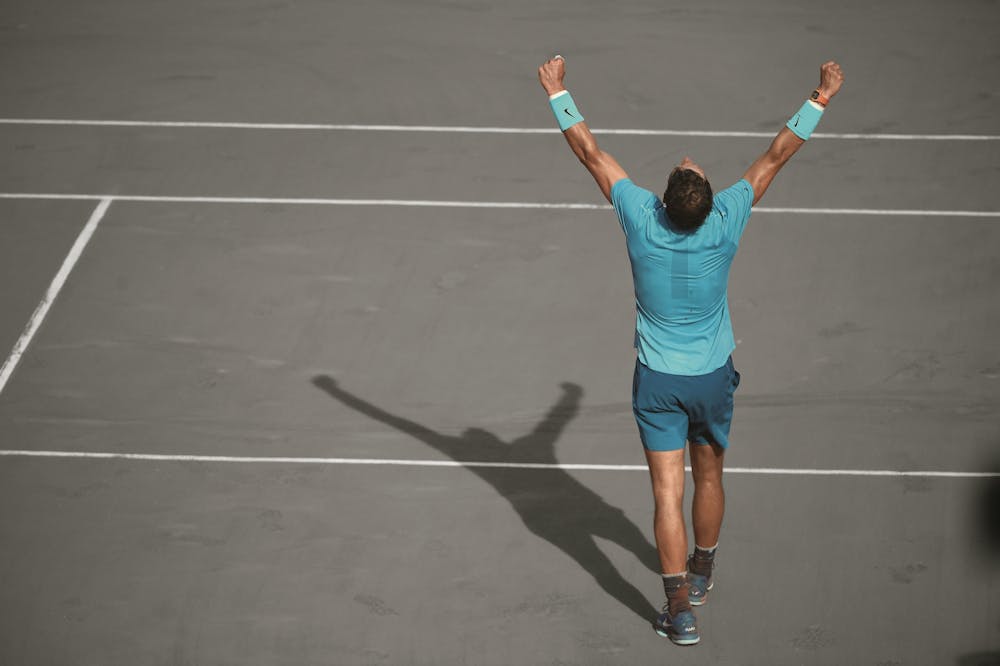 ©Corinne Dubreuil / FFT
©Corinne Dubreuil / FFTRafael Nadal, Roland-Garros 2018 semi-final
Could we say Roland-Garros is your special place?
When you start winning 1 then 2-3, it becomes a super special place. And even after 10-12 times, if you asked me which Grand Slam I would like to win again, I would have said Roland-Garros one more time. Winning the other three has being amazing, but when you reach that number, every title you add is incredible for the history of the sport and my personal history. I think the history I have here will be difficult to improve on, it’ll be a difficult record to beat.
In 2022 you won your final Roland-Garros...
2022 had been a very rough year. My body was starting to give me clear signals things were not working as they should, but I was playing well. That year I won in Australia, probably the most unexpected title in my career. But then I had a stress fracture in my rib that stopped me dead. Then I had a lot of problems with my foot and in Rome, I finished on one leg. In Paris, I was not able to practise and play properly. So, we decided to do some injections to mask the pain in my foot. I won the match against Corentin Moutet, but immediately after, I wasn’t able to put my foot down on the floor. I remember being in tears in my bed at five in the morning thinking my career at Roland-Garros was over. I talked with my doctor, who I trusted greatly, he came over from Spain and we found a way to put the nerve to sleep so we could go all the way to the final. That was the last time I won Roland-Garros. The semi-final was brutal against Sascha [Zverev] and we had that terrible situation on court. Even though I was winning at the time, I don’t know if I would have won the match if he hadn’t got injured. The quarter-final against Novak was a very emotional match with the crowd supporting me like crazy, and that atmosphere will stay in my heart and in my mind forever.
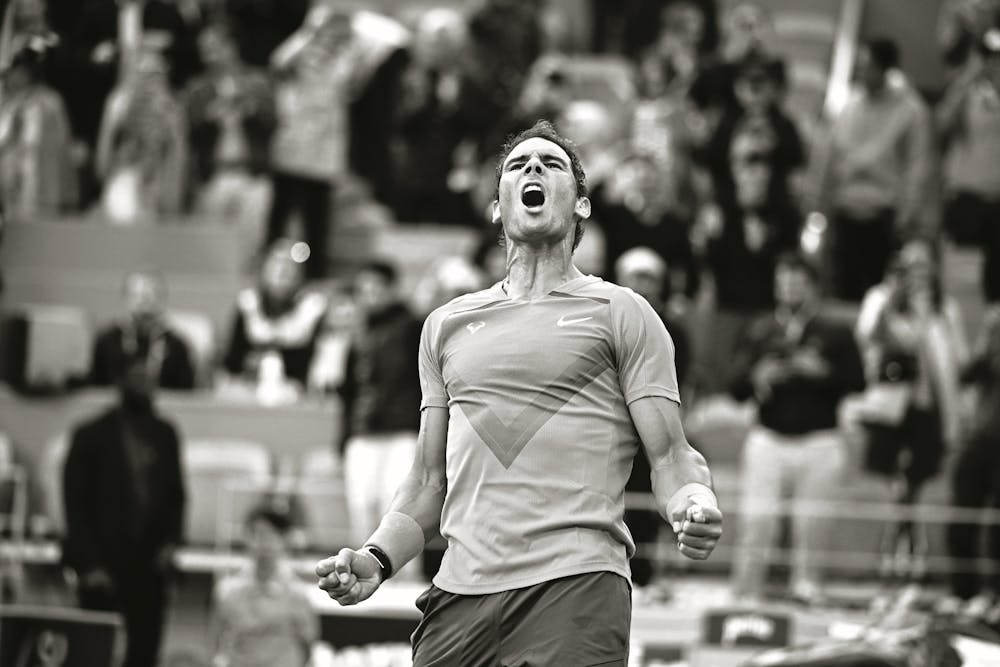 ©Corinne Dubreuil / FFT
©Corinne Dubreuil / FFTRafael Nadal, Roland-Garros 2022 quarter-final
And another very memorable match has to be the one against Zverev in 2024.
I wanted to give myself a chance to say it wasn’t going to be my last tournament, even though it was highly likely it would be. That day against Sascha was unforgettable. I had my chances, I enjoyed playing here again. It has always been impossible to describe the feeling and the crowd was huge.
You’re known for being very humble. Where does that come from?
More than humble, I just consider myself a normal guy. I am from a small village in Mallorca. I think I have been lucky to have good people and a good family around me. I received a very positive education. At the end of the day, I am just a very good tennis player. That’s true. But for everything else in life, I am just like anyone else off the tennis court. I truly believe that you don’t have to be arrogant just because you are good at one particular thing.
What would you like your legacy to be at Roland-Garros?
Words are words, examples are examples. My legacy is about passion, love, determination, hard work and trying to have as much success as possible, but always with positive values, doing things the right way. Winning is important, but it’s not everything. The numbers are there, so for sure I will be remembered as a good tennis player, but to me it’s more important to be remembered as a good person.
 ROLAND-GARROS
18 May - 7 June 2026
ROLAND-GARROS
18 May - 7 June 2026

